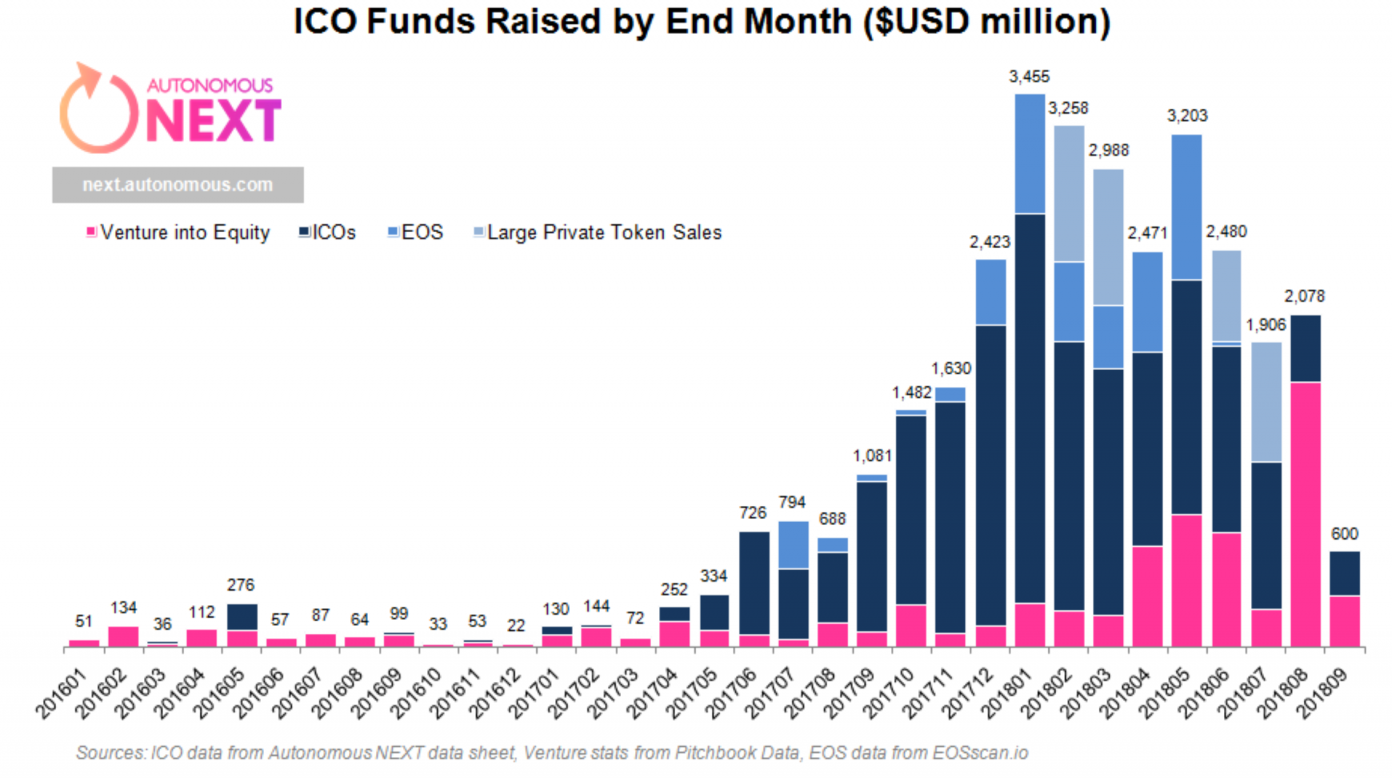According to a report from independent research company Autonomous Research, ICO activity has fallen more than 90% in 2018. Their research revealed that ICO investments were down to $300 million in September 2018, a steep drop from the high of $3 billion at the beginning of the year.

The firm cites decreasing investor interest in ICOs as one of the top reasons for the decline in funds raised via token sales. Our own survey of crypto experts has yielded similar sentiments.
Here, 9 crypto experts share whether they invest in ICOs, and why.
![]()
 Adam James, Editor-in-Chief of bitcoinist.com
Adam James, Editor-in-Chief of bitcoinist.com
I do not invest in ICOs.
While I believe there is still plenty of money to be made in the ICO space, I think the heyday for initial coin offerings has come and gone, thanks to increased regulatory scrutiny. Though I do not invest in ICOs, personally, I don’t doubt that others may find such investments lucrative in the latter half of 2018.
![]()
 Nathan Rose, Author of The Crypto Intro
Nathan Rose, Author of The Crypto Intro
I do not invest in ICOs, because it’s just too “Wild West.” Projects are raising eye-watering sums — and often not because of their intrinsic value, but largely because ICO investors are confident that they can sell their tokens at an even higher price, in the aftermarket.
Though we all want to see a more efficient world with fewer middlemen, as of right now, the traditional legal system still provides much better protections for investors, so that is what I stick to. Early-stage projects can still raise money from the public using equity crowdfunding.
![]()
 Daniel Frumkin, Cryptocurrency Analyst & Writer
Daniel Frumkin, Cryptocurrency Analyst & Writer
Not really. As a U.S. resident, I can’t and I also think the majority of ICOs are useless / scammy.
I’ve been tempted by a couple, but in my experience it’s almost always been possible to get them for cheaper prices after the ICO because projects set their hard caps way too high.
![]()
 Craig Russo, Co-founder of sludgefeed.com
Craig Russo, Co-founder of sludgefeed.com
I do not invest in ICOs. There are enough opportunities with the projects already listed on exchanges.
![]()
Owen Cook, Cryptocurrency Analyst & Writer
Yes, I do invest in ICOs. No gamble, no future.![]()
Matias Dorta, Founder of ICO Informer
When it comes to ICOs, I’m very picky. I would say I’ve invested in maybe 5 of them.
I want to make sure I’m contributing to projects that solve a problem and have a defined market. For the most part, many of them are pure speculation or “white paper ideas” and I try to stay away from those.
However, if it is a sound project, the upside on ICOs can be very rewarding.
![]()
 Tom Alford, Head of Content at TotalCrypto.io
Tom Alford, Head of Content at TotalCrypto.io
I haven’t invested in ICOs since January 2018. The reason why is that the overall cryptocurrency market cap peaked on January 7, 2018. The overall market decline has made it more challenging to realize an ROI on ICOs.
Quite simply, if you invest in an ICO and the overall market declines between when you invested in an ICO and the token being tradable on exchanges, then the token will trade at a lower value then it would have done if the overall cryptocurrency market cap was higher.
The way of thinking about this is to imagine you invested in an ICO and it achieved position 150 in overall market cap when it was finally listed on exchanges. On January 7, 2018, when the overall cryptocurrency market cap was at all-time highs, position 150 would have meant a market cap of around $184 million.
Fast forward to July 20, 2018, position 150 comes in with a market cap of just $50.5 million. This means that ICO returns are much harder to come by. Indeed this profitability problem only gets worse if you bought Ethereum at a higher price than it is now.
The problem is that the cryptocurrency market really does move as one. Most altcoins actually really only have a price in Bitcoin. The result is that different cryptocurrencies are highly co-related right now. This means that market caps for cryptocurrency projects do not reflect what they are actually worth. Instead, valuations are really just relative to other projects.
Relative valuations are an issue in the cryptocurrency market. It is exceptionally common for crypto investors to compare a new coin with an existing competitor out there. This means that investors might say that a new cryptocurrency could be worth $250 million, simply because it has a competitor that is worth that much. Very few people seem to stop and analyze the security tokens and ask themselves if they are really worth $250 million?
The truth about ICOs is that there is very little investors can do to evaluate the price an ICO might achieve when it finally hits the exchanges. The main way of doing this is by looking at the relative valuations of competitors.
However, this can lead to somewhat unprofitable decisions if the overall cryptocurrency market is going down and so are the prices of the competitors you measured your ICO against. The same logic dictates that ICOs will be more profitable when there is an overall cryptocurrency market bull run. This is because the prices of an ICO’s competitor will be constantly increasing in this sort of market environment.
The cryptocurrency bull run of late 2017 has also created another issue for ICOs. Basically, cryptocurrency projects got used to raising a lot of money and had exceptionally high hard caps. In early January 2018, it was not uncommon to see ICOs with hard caps of $25 or $40 million. The problem is that there are still many ICOs out there with over $25 million hard caps and that negatively impacts on their return profiles in the current investment environment.
Indeed many ICOs are actually hitting exchanges at a lower valuation then they were sold for at ICO.
To put this into perspective, the top 10 cryptocurrency IOTA raised just $434,500 in its ICO in November 2015. Higher ICO hard caps, simply mean that the cryptocurrency needs to achieve an even higher market cap to generate the return multiples you could get in the past.
Simply, it is just a matter that the current cryptocurrency market conditions make it significantly harder to generate returns on ICOs. There are indeed ICOs that have still done well in the current market, but just not as well as they would have done in a bull market.
It should also be noted that it is significantly harder to invest early in promising cryptocurrency projects now. There has been a rise in private sales and trend towards shrinking down the percentage of tokens available for ICO. Indeed for some of the best projects, you can only get in at private sale and that’s out of the reach of most people.
With the current ICO environment being as it is, the TotalCrypto Team is looking more at undervalued cryptocurrencies that should do well in the next bull run. A bullish change in overall cryptocurrency market conditions should change the ICO environment to a much more profitable one then we are currently experiencing.
![]()
 Brandon Quittem, Cryptocurrency Analyst & Writer
Brandon Quittem, Cryptocurrency Analyst & Writer
I do not invest in ICOs. From a merit standpoint, I think 99% of them are completely useless. Can you make money flipping them? Absolutely, but I’d rather spend my time on other things.
![]()
 Bitcoin Benny, YouTuber
Bitcoin Benny, YouTuber
Yes, sometimes I do invest in ICOs.
I generally have to be very impressed. I have strict criteria for investing as I have been burned before.![]()
What do you think of the current ICO market — would you invest in ICOs? Let us know in the comments!
Related: 10 Most Successful ICOs of All Time



